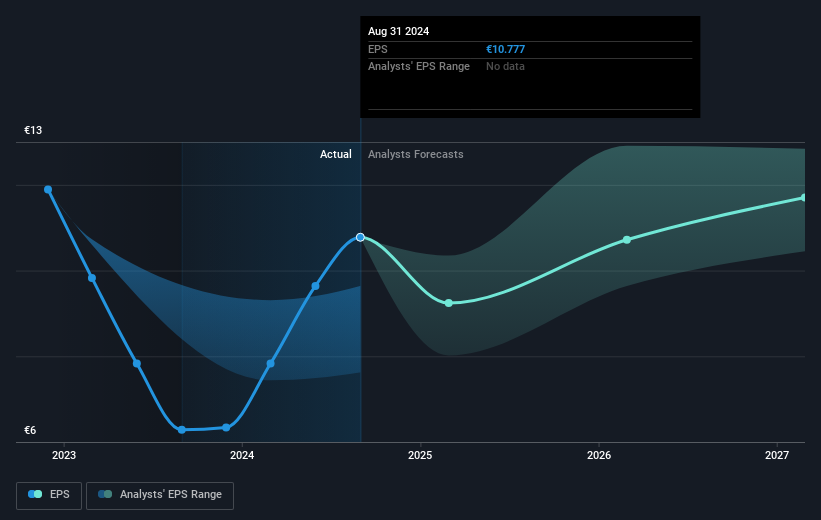- Germany
- /
- Specialty Stores
- /
- XTRA:HBH
HORNBACH Holding KGaA's (ETR:HBH) five-year earnings growth trails the 12% YoY shareholder returns

When we invest, we're generally looking for stocks that outperform the market average. And the truth is, you can make significant gains if you buy good quality businesses at the right price. For example, long term HORNBACH Holding AG & Co. KGaA (ETR:HBH) shareholders have enjoyed a 53% share price rise over the last half decade, well in excess of the market decline of around 6.0% (not including dividends). However, more recent returns haven't been as impressive as that, with the stock returning just 39% in the last year, including dividends.
Since the stock has added €59m to its market cap in the past week alone, let's see if underlying performance has been driving long-term returns.
See our latest analysis for HORNBACH Holding KGaA
To paraphrase Benjamin Graham: Over the short term the market is a voting machine, but over the long term it's a weighing machine. One imperfect but simple way to consider how the market perception of a company has shifted is to compare the change in the earnings per share (EPS) with the share price movement.
During five years of share price growth, HORNBACH Holding KGaA achieved compound earnings per share (EPS) growth of 15% per year. The EPS growth is more impressive than the yearly share price gain of 9% over the same period. Therefore, it seems the market has become relatively pessimistic about the company. This cautious sentiment is reflected in its (fairly low) P/E ratio of 7.65.
You can see below how EPS has changed over time (discover the exact values by clicking on the image).

We know that HORNBACH Holding KGaA has improved its bottom line lately, but is it going to grow revenue? If you're interested, you could check this free report showing consensus revenue forecasts.
What About Dividends?
When looking at investment returns, it is important to consider the difference between total shareholder return (TSR) and share price return. The TSR is a return calculation that accounts for the value of cash dividends (assuming that any dividend received was reinvested) and the calculated value of any discounted capital raisings and spin-offs. So for companies that pay a generous dividend, the TSR is often a lot higher than the share price return. We note that for HORNBACH Holding KGaA the TSR over the last 5 years was 75%, which is better than the share price return mentioned above. The dividends paid by the company have thusly boosted the total shareholder return.
A Different Perspective
It's good to see that HORNBACH Holding KGaA has rewarded shareholders with a total shareholder return of 39% in the last twelve months. That's including the dividend. That's better than the annualised return of 12% over half a decade, implying that the company is doing better recently. Someone with an optimistic perspective could view the recent improvement in TSR as indicating that the business itself is getting better with time. Before deciding if you like the current share price, check how HORNBACH Holding KGaA scores on these 3 valuation metrics.
If you are like me, then you will not want to miss this free list of undervalued small caps that insiders are buying.
Please note, the market returns quoted in this article reflect the market weighted average returns of stocks that currently trade on German exchanges.
Valuation is complex, but we're here to simplify it.
Discover if HORNBACH Holding KGaA might be undervalued or overvalued with our detailed analysis, featuring fair value estimates, potential risks, dividends, insider trades, and its financial condition.
Access Free AnalysisHave feedback on this article? Concerned about the content? Get in touch with us directly. Alternatively, email editorial-team (at) simplywallst.com.
This article by Simply Wall St is general in nature. We provide commentary based on historical data and analyst forecasts only using an unbiased methodology and our articles are not intended to be financial advice. It does not constitute a recommendation to buy or sell any stock, and does not take account of your objectives, or your financial situation. We aim to bring you long-term focused analysis driven by fundamental data. Note that our analysis may not factor in the latest price-sensitive company announcements or qualitative material. Simply Wall St has no position in any stocks mentioned.
About XTRA:HBH
HORNBACH Holding KGaA
Through its subsidiaries, develops and operates do-it-yourself (DIY) megastores with garden centers in Germany and other European countries.
Very undervalued with flawless balance sheet.

